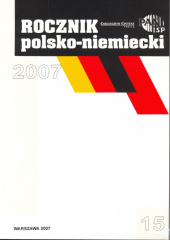Wyjazdy młodych ludzi z podwójnym obywatelstwem w poszukiwaniu pracy
Work-related migration of the dual nationality youth
Author(s): Paweł PopielińskiSubject(s): Politics / Political Sciences
Published by: Instytut Studiów Politycznych PAN
Summary/Abstract: Polish one; the so called "double passport holders" in search of work (mainly seasonal) in the countries of the "old" European Union. Also presented are the results of a survey carried out amongst the young members of the German minority in Upper Silesia with regard to their travelling abroad, in order to work, as well as to their holding of a German passport. Thanks to the holding of a German passport, a large group of people of German descent, particularly from Upper Silesia, enjoyed the experience of unlimited access to the Union's job market considerably sooner than did the (single nationality) Poles. These people migrate abroad mainly because of the difficult financial situation (the high level of unemployment in Poland, or low earnings) or because they have become accustomed to a better standard of living. For several years now, it has been possible to observe that seasonal migration to work in Holland and Germany enjoys a greater popularity. It is mostly young people who tend to become migrant workers, with seasonal work, mainly in Holland, being particularly popular amongst the youth. After vocational or secondary school, young people frequently see no future prospects in Poland and abandon further education in order to go abroad to work and make money as quickly as is possible. People working abroad principally do heavy work, frequently not in their own field but in those occupations which the Dutch and Germans have no wish to practice. The phenomenon of work-related migration is giving rise to a great many social problems. In its social dimension, it is, in principle, bringing about more troubles than benefits.
Journal: Rocznik Polsko-Niemiecki / Deutsch-Polnisches Jahrbuch
- Issue Year: 2007
- Issue No: 15
- Page Range: 105-123
- Page Count: 19
- Language: Polish

